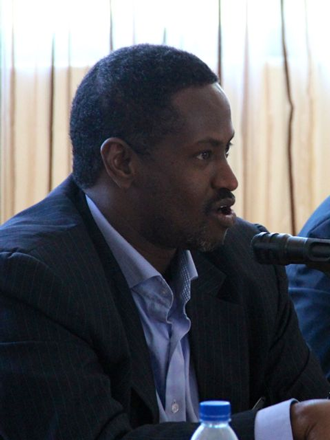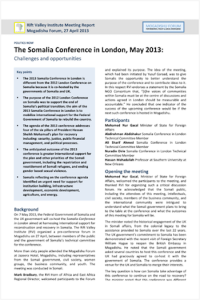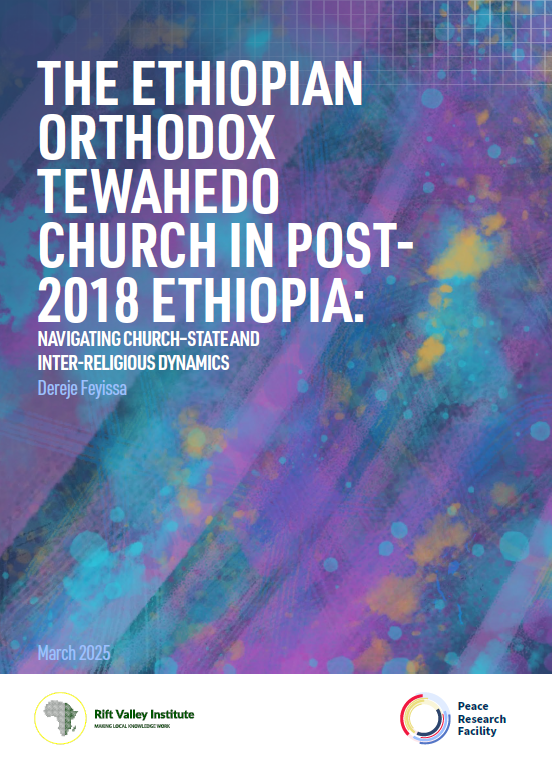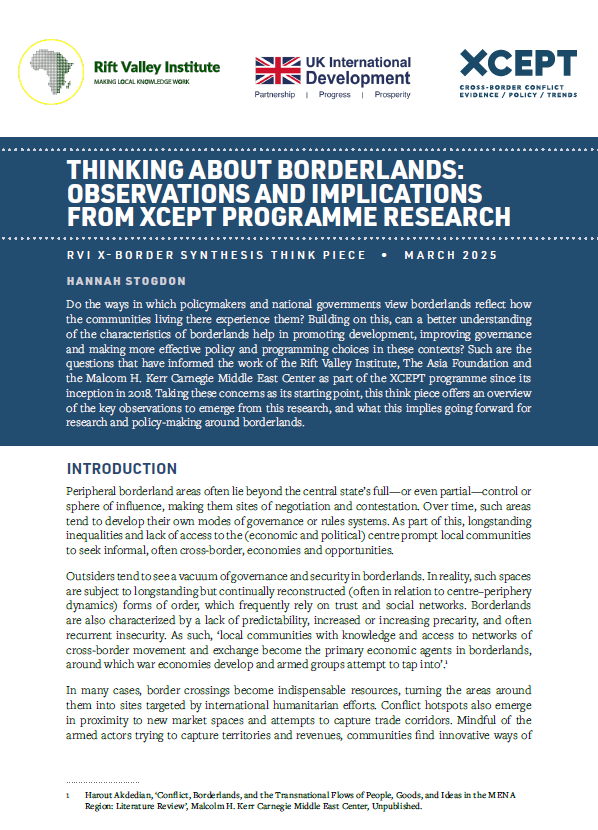Key points
-
The 2013 Somalia Conference in London is different from the 2012 London Conference on Somalia because it is co-hosted by the governments of Somalia and UK.
-
The purpose of the 2012 London Conference on Somalia was to support the end of Somalia’s political transition; the aim of the 2013 Somalia Conference in London is to mobilize international support for the Federal Government of Somalia to rebuild the country.
-
The agenda of the 2013 conference addresses four of the six pillars of President Hassan Sheikh Mohamud’s plan for recovery including: security, justice, public financial management, and political processes.
-
The anticipated outcome of the 2013 conference is greater international support for the plan and other priorities of the Somali government, including the repatriation and resettlement of Somali refugees, and ending gender based sexual violence.
-
Somalis reflecting on the conference agenda identified an urgent need for support for institution building, infrastructure development, economic development, agriculture, and energy.
Background
On 7 May 2013, the Federal Government of Somalia and the UK government will co-host the Somalia Conference in London aimed at harnessing international support for reconstruction and recovery in Somalia. The Rift Valley Institute (RVI) organized a pre-conference forum in Mogadishu on 27 April, between members of the public and the government of Somalia’s technical committee for the conference.
More than sixty people attended the Mogadishu Forum at Jazeera Hotel, Mogadishu, including representatives from the Somali government, civil society, women groups, the business community, and youth. The meeting was conducted in Somali.
Mark Bradbury, the RVI Horn of Africa and East Africa Regional Director, welcomed participants to the Forum and explained its purpose. The idea of the meeting, which had been initiated by Yusuf Garaad, was to give Somalis the opportunity to better understand the purpose of the conference and to contribute ideas to it. In this respect RVI endorses a statement by the Somalia NGO Consortium that, “[t]he voices of communities within Somalia must be at the centre of discussions and actions agreed in London should be measurable and accountable.” He concluded that one indicator of the success of the upcoming conference would be if the next such conference is hosted in Mogadishu.
Participants
Mohamed Nur Gacal; Minister of State for Foreign Affairs
Abdirahman Abdishakur; Somalia Conference in London Technical Committee Member
Ali Sharif Ahmed; Somalia Conference in London Technical Committee Member
Nuradin Dirie; Somalia Conference in London Technical Committee Member
Hassan Mahadallah; Professor at Southern University at New Orleans
Opening the meeting
Mohamed Nur Gacal, Minister of State for Foreign Affairs, welcomed the participants to the meeting, and thanked RVI for organizing such a critical discussion forum. He acknowledged that the Somali public, including the attendees of this meeting, intellectuals, civil society, members of the business community, and the international community were intrigued to understand what the Somali government plans to bring to the table at the conference and what the outcomes of this meeting for Somalia will be.
 The minister noted the historical engagement of the UK in Somali affairs, from the colonial legacy to the assistance provided to Somalia over the last 22 years. The UK government’s commitment to Somalia has been demonstrated with the recent visit of Foreign Secretary William Hague to reopen the British Embassy in Mogadishu. He noted that the Somali government asked several countries to host this conference and the UK had graciously agreed to co-host it with the government of Somalia. The conference provides a venue for the UK and Somalia to merge their interests.
The minister noted the historical engagement of the UK in Somali affairs, from the colonial legacy to the assistance provided to Somalia over the last 22 years. The UK government’s commitment to Somalia has been demonstrated with the recent visit of Foreign Secretary William Hague to reopen the British Embassy in Mogadishu. He noted that the Somali government asked several countries to host this conference and the UK had graciously agreed to co-host it with the government of Somalia. The conference provides a venue for the UK and Somalia to merge their interests.
The key question is how can Somalia take advantage of this conference to continue on the road to recovery? The minister noted that this conference was different from the previous one in 2012 because Somalia was not just an attendee but was co-hosting it and setting the agenda. In this regard the government had delegated a technical committee to facilitate and coordinate Somalia’s participation in the conference. The committee, set up in January, has been consulting with different segments of society and the minster encouraged the committee members to take into consideration the ideas and opinions of the participants of this forum.
The purpose of the conference
Abdirahman Abdishakur introduced himself as the head of the government technical committee organizing the conference, which had been established four months earlier in January 2012. He explained that the upcoming conference was different from the 2012 meeting. While the former was titled the “London Conference on Somalia”, the 2013 conference is titled the “Somalia Conference in London”. The aim of the 2012 conference was to help end the political transition, while the 2013 conference aims to galvanize international support for the Federal Government of Somalia, and their priorities for rebuilding the country.
Uniquely, the 2013 conference will be co-hosted, co-convened, and co-organized by the UK and Somalia, with the UK Prime Minister, David Cameron, and the President of the Somalia Federal Government, Hassan Sheikh Mohamud, co-chairing. The two countries have collaborated on every step of the process. A joint technical committee from Somalia and the UK has been preparing for the conference since January, with the conference agenda and keynote speakers decided by both countries.
Mr. Abdishakur also stated that the committee shares its work plan with a core group of 17 countries including the neighboring countries, Djibouti, Ethiopia, Kenya, and Uganda. In May, there will be a special conference on Somalia in Japan – TICAD V – that will focus on socio-economic development, specifically on human security. In September, an EU conference will address a comprehensive set of Somali government priorities for rebuilding the state.
Mr. Abdishakur concluded by notifying the audience that the Somaliland issue is under negotiation and Somaliland may join the meeting under certain terms and conditions, but that the Somali Federal Government is the only government recognized as a legitimate partner and will be representing the country under one delegation led by the president.
The conference agenda
Ali Sharif Ahmed discussed the conference agenda which was to address four pillars of President Hassan Sheikh Mohamud’s six pillar plan: security, justice, public financial management systems, and political processes.
With regards to security and justice, Mr. Ahmed highlighted that as a failed state for the past 22 years Somalia has a great deal of reform to make. Mr. Ahmed said, “if there is no justice, there is no security, and if there is no security there is no economy.” He added a National Conference on Justice Reform was recently held by the government in which more than 150 people participated including members of the judiciary, lawyers and court employees, members of parliament, representatives from the armed forces, the police, the National Security Agency, prisons, civil society organizations, human rights organizations, women groups, and religious leaders, traditional elders, and international legal experts.
There are three main objectives to address in the upcoming conference with regards to justice. First, to secure international funding to enable Somalia to rebuild judicial institutions. Second to support and strengthen the Somali police so they are seen as a legitimate institution. Third, capacity building of the military. The lifting of the arms embargo enables Somalia to bring in equipment and trainers. Currently, five donors including the European Union, African Union, Turkey, UK, and US have agreed to provide military training.
Mr. Ahmed highlighted how the Somali government was setting up a system of accountability that was corruption free in order to receive funds. This will be a system based in Somalia and managed by a joint Somali and international community-led board. This is currently being tested in Somalia by the Norwegians who are funding the Somali government directly through this channel.
Mr. Ahmed added that other themes to be tackled in the conference include trade and investment, aid coordination, sexual violence, and women empowerment.
Expected outcomes
Nurudin Dirie stated that the Somali government will present a complete plan with budgets that includes building security forces, financial institutions, the justice sector, the orderly repatriation and resettlement of Somali refugees in regional countries, and sexual violence. The plan will be shared with all 54 countries that will participate in the conference and asked to accept, support, and agree on the plan, and provide financial and technical assistance. In addition, the Somali government will have a vision of managing the political process until 2016 which includes elections and the establishment of regional administrations.
Mr. Dirie added that the international community will be asked to provide continued support to the UN Resolution pertaining to AMISOM, and a UN Resolution on Somalia bringing all UN agencies under one umbrella. Mr. Dirie emphasized that the conference is government-to-government though international agencies such as the International Monitory Fund and World Bank will also participate. However, there are events that civil society can participate in, including a diaspora forum in London. There is also an event focusing on Somali women’s empowerment organized by the Office of the Prime Minister. He further added that on 8 May, the Somali business community in London will present their business approaches and share ideas with international corporations.
A critical perspective
Hassan Mahadallah, Professor at Southern University at New Orleans, provided a critique of the conference. He started with the six pillar plan and the prioritization of security in the conference. He also noted that justice is more than just diya payment. He emphasized that what is missing is institutional development to enable Somalis to negotiate in meaningful ways. Without robust financial institutions all economic aid will be wasted. Another important factor missing in the agenda is the development of national infrastructure and energy development. Somali agriculture and industry was suffering from a lack of these. The government, he added, needs to present five mega project plans that include institution building, infrastructure, economic development, farming, and energy.
Discussion
Sexual Violence
The first part of the discussion was dominated by the issue of sexual violence. The group was split on the matter. Some participants expressed concern that it was on the conference agenda, arguing that it was the symptom of a deeper problem in the justice system. Others supported its inclusion on the conference agenda. One of the participants claimed that of 1,000 recent police graduates, only 18 were women. It was also noted that sexual violence is common around the world and Somalia is not an exception. While some participants suggested that the prevalence of sexual violence in Somalia is often exaggerated, others disputed this saying that it has been prevalent since the beginning of the civil war, and that refugee and internally displaced women and children are particularly vulnerable. Most participants acknowledged that sexual violence must be addressed as a human rights issue, and that there is a need for widespread human rights education.
Economic Development
The attendees of the meeting urged that the development of infrastructure should be included in the agenda. Without adequate infrastructure, national development and economic recovery cannot be achieved.
The development plan has to include restarting and renovating small and medium sized factories, starting new businesses, and strengthening existing ones to create employment opportunities. The backbone of the Somali economy is livestock and farming. Unless these sectors are supported the Somali economy will not recover. Somalia needs to export livestock, bananas, fish, and other such products. The World Food Programme needs to buy from Somali farmers. Importing goods will not increase the productivity of the country. Somalis need to become free from aid dependency, and strengthen import and export businesses. Mogadishu port generates millions of dollars but is currently mismanaged.
There is a need for the Somali diaspora business community to connect with businesses in Somalia to exchange ideas and broaden market opportunities. Developing commercial laws and building business sector institutions such as the Chamber of Commerce were noted as important. The cost of energy in Somalia is currently approximately $120/kwh. The six companies holding a monopoly on electricity set the price. Participants urged that the development of electricity infrastructure and regulations be included in the London agenda. Again, without this national development cannot be achieved.
Security and Justice
During the conflict Somalia’s justice system collapsed. The need to rebuild the justice system was emphasized during the forum. There is a need for more law schools, national training institutes, police training in human rights, professional trainings on how to treat criminals in a humane way, an arbitrary independent tribunal, and the vetting of all judges. There is also a need to renovate law enforcement infrastructure, and to provide transportation for judges.
Youth and Development
The participants further expressed that without improvements in education, security will not be achieved. The vast majority of Somali youth have lacked the opportunity to be educated and to obtain skills training in the past two decades. Indeed, the issue of youth and job creation is integral to all issues on the agenda.



